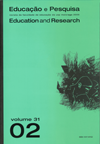Educação ambiental como política pública
DOI:
https://doi.org/10.1590/S1517-97022005000200010Palabras clave:
Educação ambiental, Políticas públicas, Sociedade civil, AmbientalismoResumen
A educação ambiental surge como uma das possíveis estratégias para o enfrentamento da crise civilizatória de dupla ordem, cultural e social. Sua perspectiva crítica e emancipatória visa à deflagração de processos nos quais a busca individual e coletiva por mudanças culturais e sociais estão dialeticamente indissociadas. A articulação de princípios de Estado e comunidade, sob a égide da comunidade, coloca o Estado como parceiro desta no processo de transformação do status quo situado, segundo Boaventura de Souza Santos, como um "novíssimo movimento social". A tal Estado cumpre o papel de fortalecer a sociedade civil como sede da superestrutura. No campo ambiental, o Estado tem crescido em termos de marcos regulatórios sem uma capacidade operacional que condiga com a demanda em vista da redução do Estado (década de 1990) e da ausência de reformas que não sejam a do Estado mínimo. À educação ambiental cumpre, portanto, contribuir com o processo dialético Estado-sociedade civil que possibilite uma definição das políticas públicas a partir do diálogo. Nesse sentido, a construção da educação ambiental como política pública, implementada pelo Ministério da Educação e Cultura (MEC) e pelo Ministério do Meio Ambiente (MMA), implica processos de intervenção direta, regulamentação e contratualismo que fortalecem a articulação de diferentes atores sociais (nos âmbitos formal e não formal da educação) e sua capacidade de desempenhar gestão territorial sustentável e educadora, formação de educadores ambientais, educomunicação socioambiental e outras estratégias que promovam a educação ambiental crítica e emancipatória. As políticas públicas em educação ambiental implicarão uma crescente capacidade do Estado de responder, ainda que com mínima intervenção direta, às demandas que surgem do conjunto articulado de instituições atuantes na educação ambiental crítica e emancipatória.Descargas
Los datos de descarga aún no están disponibles.
Descargas
Publicado
2005-08-01
Número
Sección
Em Foco: Educação ambiental
Licencia
Los conceptos emitidos en los artículos son de exclusiva responsabilidad de sus autores y no reflejan necesariamente la opinión de la redacción.
Está permitida la reproducción total o parcial de los trabajos, siempre y cuando se indique explícitamente la fuente.
Cómo citar
Educação ambiental como política pública . (2005). Educação E Pesquisa, 31(2), 285-299. https://doi.org/10.1590/S1517-97022005000200010



